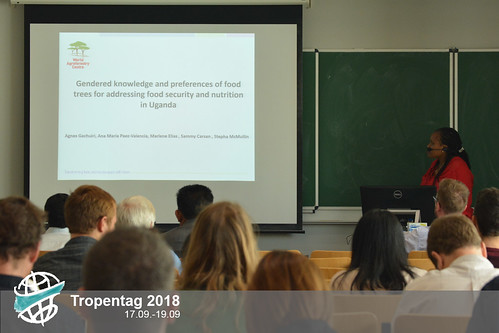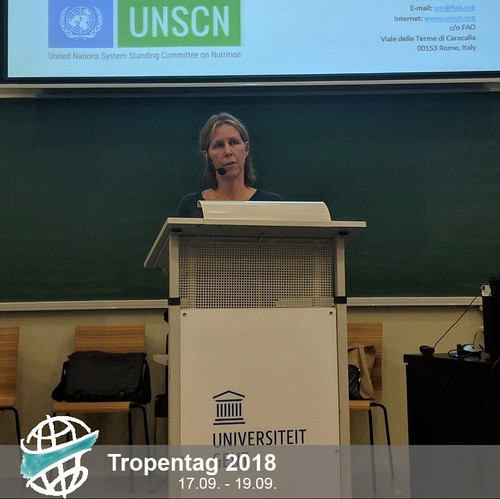Blogs

More drought for better nutrition
Tue, 09/18/2018 - 18:48 — agyeiDuring this afternoon's oral presentation session "soil and soil fertility", a presentation from the project Healthy Land with controversial research title " Do we need more drought for better nutrition? - Water stress on nutrient content of food" was observed. Sahrah Fischers PhD work became center stage for discussion prior to the oral presentation given by Mr. Thomas Hilger in the absence of Sarah Fisher at this year's Tropentag. With such a conrtroversial heading, it wasn't surprising that the AUD E4 was almost filled to capacity with attendants who have been driven to the auditorium to unmask the villain.
Diving deeper into this research work, Mr. Hilger gave a clear introduction to this research by stating reasons why plants are important for human nutrition. Again, he pointed out clearly that with increasing extreme weather events, sudden drought periods can affect plant growth, bioavailability of nutrients and and quality of produced food. This then led to the aim of their study which was conducted in 2016 in two regions in East Africa (Kapchorwa, Uganda and Busia, Kenya) in order to identify whether drought have an impact on the nutrient composition of produced food.
Ebola outbreak: don’t blame only bush meat
Tue, 09/18/2018 - 17:19 — Onu EkpaIn Sierra Leone, Guinea and Liberia, the recent Ebola virus (EBOV) outbreak was devastating and led to more than 10,000 death. But who or what should we blame? - wild, domestic animals or both ...? That is the question Juliet Jabaty from Sierra Leone Agricultural Research Institute tries to find answers to. She agrees that bush animals such as bat and monkey are the major reservoir of EBOV but more animals could be culprit in cases reported. This critical research gap is yet to be filled hence Juliet researched on “The Role of Livestock and Wildlife in the Biology of Ebolaviruses”. She hypothesized that pigs, dogs and some ruminants can serve as reservoir for transmission of EBOV.
Why do women prefer mango?
Tue, 09/18/2018 - 17:00 — huidobroBelieve it or not, there are gender preferences for fruit producing trees! This is what Agnes Gachuri, from the World Agroforestry Center (ICRAF), presented in one of the oral presentation sessions at Tropentag 2018. It is known that the fruit producing trees have an important role in rural livelihoods and food security. But when it comes to which kind of trees to cultivate, the farmers have to make a decision. They are the ones that have local knowledge and prioritize the species cultivation, as well as household use. However, sometimes farmers fail to consider the potential of local varieties due to market demand, lack of seed availability, or knowledge transfer.
Catching the eye of development sectors: Nutrition dances in all the scenarios
Tue, 09/18/2018 - 14:53 — Diana SantosOver the last decade, nutrition became a rising concern across the globe. Not only amongst scientific groups, but mainstream media began to amplify the attention on nutrition, such as the campaign #HungerZero. Nutrition has always been a critical topic, however it is now that people are realizing the essential role of nutrition in human development in all its dimensions, from the basis of health to the economic push-ups of nations.
Nourishment by Insects!?
Tue, 09/18/2018 - 14:48 — degodoyYes, this idea is slowly being more accepted by western societies and becoming accessible to the increasingly growing population worldwide, as we could see in some of the presentations today! Traditionally used in Asian, Latin American and African cuisines, this practice has the potential to play an important role for nutrition security, helping to attend food demand and combat hunger. Due to the limited amount of agricultural land and natural resources, there is an urgent need to find other alternatives for protein sources than conventional meat products. In some places (e.g. Kenya and Uganda), it already constitutes 5–10% of protein intake of the rural and urban populace. Also, livestock production is a leading cause of anthropogenic-induced climate change; therefore more sustainable diets are needed.
Africa indigenous vegetables face extinction!
Tue, 09/18/2018 - 14:41 — Onu EkpaKenya like many other African countries faces double nutrition burden – undernutrition and over-nutrition. The former is due to inadequate nutrient intake and the latter could be attributed to changes in lifestyle such as consumption of western food junks coupled with a sedentary lifestyle, paraphrased from Anne Aswani Musotsi’s presentation. Anne is from Jomo Kenyatta University of Agriculture and Technology, Kenya and she presented on – “African Indigenous Vegetables (AIV) Contribution Towards Food Security and Safety in Kenya: A Meal Cultures Perspective”. She mentioned that AIV could ensure nutrition security but unfortunately the consumption is low and many of the vegetables are going into extinction. This is counterintuitive especially in a society with malnutrition and millions of people suffering from avoidable and irreversible nutritional consequences. AIV consumption is very low. Due to changes in cultural practices over the years, people eat other crops and shifted attention from indigenous vegetables – colonial influence paradigm.
Eat egg during pregnancy, get a stupid baby
Tue, 09/18/2018 - 13:44 — Onu EkpaThe title sounds very strange but it is a perception in some regions in Africa including the upper region of Gambia. Taboos during pregnancy are one of the many forms of food taboos present in Africa, influencing consumption pattern and food habit. Therefore, it is imperative to consider the cultural elements of the people in every intervention to ensure optimal impact. This thought was considered in Céline Termote’s research on “Role of Biodiversity in Improving Dietary Diversity and Quality of Complementary Foods for Infants and Young Children in Southern Benin”.
In Zambia, if you touch maize, you lose an election!
Tue, 09/18/2018 - 10:24 — Onu EkpaAgriculture can improve nutrition but it is not what you think. Namukolo Covic, coordinator A4NH in Ethiopia gave an interesting perspective in her keynote speech at the plenary session II. She reiterated that countries must leverage on non-agricultural sectors to complement agricultural interventions. Unless this is done, agriculture and food systems cannot work to ensure optimal nutrition outcome. This is not peculiar to developing countries, even the developed countries face similar challenges. An integrated or holistic approach will no doubt improve the contribution of agriculture to food security and nutrition.






